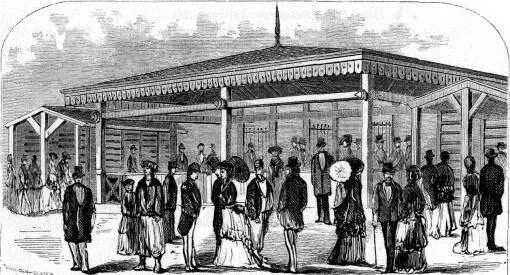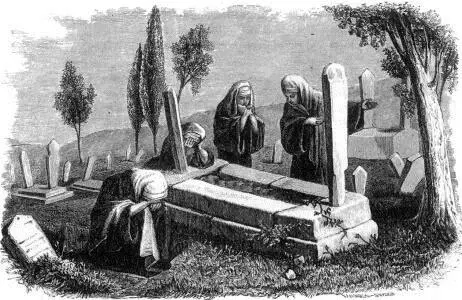Various - Lippincott's Magazine of Popular Literature and Science, Volume 17, No. 102, June, 1876
Здесь есть возможность читать онлайн «Various - Lippincott's Magazine of Popular Literature and Science, Volume 17, No. 102, June, 1876» — ознакомительный отрывок электронной книги совершенно бесплатно, а после прочтения отрывка купить полную версию. В некоторых случаях можно слушать аудио, скачать через торрент в формате fb2 и присутствует краткое содержание. Издательство: Иностранный паблик, Жанр: foreign_antique, periodic, foreign_edu, на английском языке. Описание произведения, (предисловие) а так же отзывы посетителей доступны на портале библиотеки ЛибКат.
- Название:Lippincott's Magazine of Popular Literature and Science, Volume 17, No. 102, June, 1876
- Автор:
- Издательство:Иностранный паблик
- Жанр:
- Год:неизвестен
- ISBN:нет данных
- Рейтинг книги:3 / 5. Голосов: 1
-
Избранное:Добавить в избранное
- Отзывы:
-
Ваша оценка:
- 60
- 1
- 2
- 3
- 4
- 5
Lippincott's Magazine of Popular Literature and Science, Volume 17, No. 102, June, 1876: краткое содержание, описание и аннотация
Предлагаем к чтению аннотацию, описание, краткое содержание или предисловие (зависит от того, что написал сам автор книги «Lippincott's Magazine of Popular Literature and Science, Volume 17, No. 102, June, 1876»). Если вы не нашли необходимую информацию о книге — напишите в комментариях, мы постараемся отыскать её.
Lippincott's Magazine of Popular Literature and Science, Volume 17, No. 102, June, 1876 — читать онлайн ознакомительный отрывок
Ниже представлен текст книги, разбитый по страницам. Система сохранения места последней прочитанной страницы, позволяет с удобством читать онлайн бесплатно книгу «Lippincott's Magazine of Popular Literature and Science, Volume 17, No. 102, June, 1876», без необходимости каждый раз заново искать на чём Вы остановились. Поставьте закладку, и сможете в любой момент перейти на страницу, на которой закончили чтение.
Интервал:
Закладка:
Another of them is that triumph of pure reason, chess, an unadulterated product of the brain—i.e., of phosphorus—i.e., of fish. Nobody stakes money on chess or offers a prize to the best player. Honor at that board is its own reward. So when we are told of the Centennial Chess Tournament we recognize at once the fitness of the word borrowed from the chivalric joust. It is the culmination of human strife. The thought, labor and ardor spread over three hundred and fifty acres sums itself in that black and white board the size of your handkerchief. War and statecraft condense themselves into it. Armies and nations move with the chessman. Sally, leaguer, feint, flank-march, triumphant charge are one after another rehearsed. There, too, moves the game of politics in plot and counterplot. It is the climax of the subjective. From those lists the trumpet-blare, the crowd, the glitter, the banners, "the boast of heraldry and pomp of power," melt utterly away. To the world-champions who bend above the little board the big glass houses and all the treasures stared at by admiring thousands are as naught.

SCENE AT ONE OF THE ENTRANCES TO THE GROUNDS—THE TURNSTILE.
But man is an animal, and not by any means of intellect all compact. The average mortal confesses to a craving for the stimulus of great shows, of material purposes, substantial objects of study and palpable prizes. It is so in 1876, as it was in 1776, and as it will be in a long series of Seventy-sixes.
It is the concrete rather than the abstract which draws him in through the turnstiles of the exposition enclosure. Separated by the divisions of those ingeniously-contrived gates into taxed and untaxed spectators, the masses stream in with small thought of the philosophers or the chess-players. Their minds are reached, but reached through the eye, and the first appeal is to that. Each visitor constitutes himself a jury of one to consider and compare what he sees. The hundreds of thousands of verdicts so reached will be published only by word of mouth, if published at all. Their value will be none the less indubitable, though far from being in all cases the same. The proportion of intelligent observers will be greater than on like occasions heretofore. So will, perhaps, be that of solid matter for study, although in some specialties there may be default. He who enters with the design of self-education will find the text-books in most branches abundant, wide open before him and printed in the clearest characters. What shortcomings there may have been in the selection and arrangement of them he will have, if he can, himself to remedy. There stands the school, founded and furnished with great labor. The would-be scholar can only be invited to use it. The centennial that is to turn out scholars ready-made has not yet rolled round.
DOLORES
A light at her feet and a light at her head,
How fast asleep my Dolores lies!
Awaken, my love, for to-morrow we wed—
Uplift the lids of thy beautiful eyes.
Too soon art thou clad in white, my spouse:
Who placed that garland above thy heart
Which shall wreathe to-morrow thy bridal brows?
How quiet and mute and strange thou art!
And hearest thou not my voice that speaks?
And feelest thou not my hot tears flow
As I kiss thine eyes and thy lips and thy cheeks?
Do they not warm thee, my bride of snow?
Thou knowest no grief, though thy love may weep.
A phantom smile, with a faint, wan beam,
Is fixed on thy features sealed in sleep:
Oh tell me the secret bliss of thy dream.
Does it lead to fair meadows with flowering trees,
Where thy sister-angels hail thee their own?
Was not my love to thee dearer than these?
Thine was my world and my heaven in one.
I dare not call thee aloud, nor cry,
Thou art so solemn, so rapt in rest,
But I will whisper: Dolores, 'tis I:
My heart is breaking within my breast.
Never ere now did I speak thy name,
Itself a caress, but the lovelight leapt
Into thine eyes with a kindling flame,
And a ripple of rose o'er thy soft cheek crept.
But now wilt thou stir not for passion or prayer,
And makest no sign of the lips or the eyes,
With a nun's strait band o'er thy bright black hair—
Blind to mine anguish and deaf to my cries.
I stand no more in the waxen-lit room:
I see thee again as I saw thee that day,
In a world of sunshine and springtide bloom,
'Midst the green and white of the budding May.
Now shadow, now shine, as the branches ope,
Flickereth over my love the while:
From her sunny eyes gleams the May-time hope,
And her pure lips dawn in a wistful smile.
As one who waiteth I see her stand,
Who waits though she knows not what nor whom,
With a lilac spray in her slim soft hand:
All the air is sweet with its spicy bloom.
I knew not her secret, though she held mine:
In that golden hour did we each confess;
And her low voice murmured, Yea, I am thine,
And the large world rang with my happiness.
To-morrow shall be the blessedest day
That ever the all-seeing sun espied:
Though thou sleep till the morning's earliest ray,
Yet then thou must waken to be my bride.
Yea, waken, my love, for to-morrow we wed:
Uplift the lids of thy beautiful eyes.
A light at her feet and a light at her head,
How fast asleep my Dolores lies!
GLIMPSES OF CONSTANTINOPLE
CONCLUDING PAPER

SCENE IN A BURIAL-GROUND.
There is a continuous fascination about this old city. The guide-book says, "A week or ten days are required to see the sights," but though we make daily expeditions we seem in no danger of exhausting them. Neither does one have to go far to seek amusement. I never look down into the street below my windows without being attracted by some object of interest. The little donkeys with their great panniers of long slim loaves of bread (oh, tell it not, but I once saw the driver use one as a stick to belabor the lazy animal with, and then leave it, with two or three other loaves, at the opposite house, where a pretty Armenian, that I afterward saw taking the air on the roof with her bright-eyed little girl, perhaps had it for her breakfast!); the fierce, lawless Turkish soldiers stalking along, their officers mounted, and looking much better in their baggy trousers and frock-coats on their fine horses than on foot; Greek and Armenian ladies in gay European costumes; veiled Turkish women in their quiet street-dress; close carriages with gorgeously-dressed beauties from the sultan's harem followed by black eunuchs on horseback,—these and similar groups in every variety of costume form a constant stream of strange and picturesque sights.
One morning, attracted by an unusual noise, I looked out and found it proceeded from a funeral procession. First came a man carrying the lid of the coffin; then several Greek priests; after them boys in white robes with lighted candles, followed by choir-boys in similar dresses who chanted as they walked along. Such sounds! Greek chanting is a horrible nasal caterwauling. Get a dozen boys to hold their noses, and then in a high key imitate the gamut performed by several festive cats as they prowl over the housetops on a quiet night, and you have Greek, Armenian or Turkish chanting and singing to perfection. There is not the first conception of music in the souls of these barbarians. Behind this choir came four men carrying the open coffin. The corpse was that of a middle-aged man dressed in black clothes, with a red fez cap on the head and yellow, red and white flowers scattered over the body. The hot sun shone full on the pinched and shriveled features, and the sight was most revolting. Several mourners followed the coffin, the ladies in black clothes, with black lace veils on their heads and their hair much dressed. The Greeks are obliged to carry their dead in this way, uncovered, because concealed arms were at one time conveyed in coffins to their churches, and then used in an uprising against the government. We witnessed a still more dreadful funeral outside the walls. A party, evidently of poor people, were approaching an unenclosed cemetery, and we waited to see the interment. The body, in its usual clothes, was carried on a board covered by a sheet. When they reached the grave the women shrieked, wept and kissed the face of the dead man: then his clothes were taken off, the body wrapped in the sheet and laid in the grave, which was only two feet deep. The priest broke a bottle of wine over the head, the earth was loosely thrown in, and the party went away. There is no more melancholy spot to me than a Turkish cemetery. The graves are squeezed tightly together, and the headstones, generally in a tumble-down state, are shaped like a coffin standing on end, or like a round hitching-post with a fez cap carved on the top. Weeds and rank wild-flowers cover the ground, and over all sway the dark, stiff cypresses.
Читать дальшеИнтервал:
Закладка:
Похожие книги на «Lippincott's Magazine of Popular Literature and Science, Volume 17, No. 102, June, 1876»
Представляем Вашему вниманию похожие книги на «Lippincott's Magazine of Popular Literature and Science, Volume 17, No. 102, June, 1876» списком для выбора. Мы отобрали схожую по названию и смыслу литературу в надежде предоставить читателям больше вариантов отыскать новые, интересные, ещё непрочитанные произведения.
Обсуждение, отзывы о книге «Lippincott's Magazine of Popular Literature and Science, Volume 17, No. 102, June, 1876» и просто собственные мнения читателей. Оставьте ваши комментарии, напишите, что Вы думаете о произведении, его смысле или главных героях. Укажите что конкретно понравилось, а что нет, и почему Вы так считаете.












